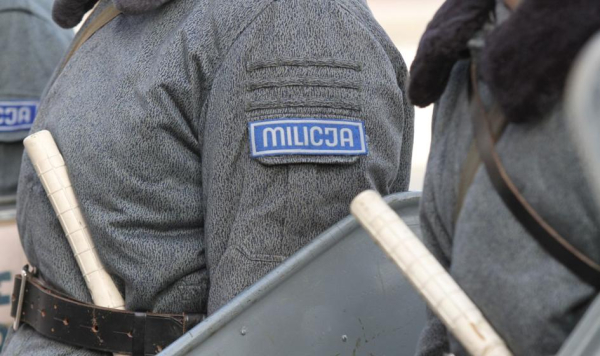The Law and Justice party's (PiS) decommissioning law, which was supposed to be a success, has so far cost the state over PLN 2.5 billion, as courts have mostly ruled to restore the benefits that were withdrawn, Deputy Minister of Internal Affairs and Administration Wiesław Szczepański told the Polish Press Agency (PAP). He added that this amount could finance housing benefits for 160,000 officers.

Polish Press Agency: Mr. Minister, is there anything else happening regarding the restoration of pension rights taken away from officers of the Polish People's Republic services?
Wiesław Szczepański, Deputy Minister of Interior and Administration: In 2008, a law was passed reducing the pay of officers who served before 1990. It reduced the pension from the previous basic level of 2.6 to 0.7. The law was not appealed or challenged by the Constitutional Tribunal. It remained in force in its enacted form until December 16, 2016. Then, during the famous vote in the Column Hall, PiS MPs voted to lower the aforementioned index from 0.7 to 0.
Advertisement See also: Take part in our stock market multi-thlon! Disciplines: sprint for stocks, dive into ETFs, and push your wallet for the prize.
PAP: As a result, pensions and annuities paid to officers of the Polish People's Republic services could not be higher than the average benefit paid by the Social Insurance Institution (ZUS).
WS: Exactly. Of course, the law included Article 8a, which allowed for amnesty, and then, after meeting certain conditions, these benefits could be restored to the 2.6 index. However, this “benefit” was bestowed upon just over 30 officers during the PiS era, and that was in the early months of 2017. Article 8a later fell into disuse, although we know that at least a thousand beneficiaries applied for this provision. We also know that as a result of the revocation of pension rights, i.e., as a result of this law, tragedies occurred, and nearly 100 people took their own lives.

It is important to remember that the Act of December 16, 2016, affected over 39,000 beneficiaries, for whom the Pension and Disability Institution of the Ministry of Interior and Administration issued nearly 58,000 decisions re-evaluating their benefits. This means that sometimes a beneficiary received two decisions. A total of nearly 27,000 beneficiaries appealed these decisions, leaving them with legal recourse. Initially, the courts suspended the proceedings until the Constitutional Tribunal reviewed the challenged act. However, then-President of the Constitutional Tribunal, Julia Przyłębska, withdrew the hearing from the docket, and the Constitutional Tribunal has not returned to it to this day. In the meantime, the Supreme Court has stated that each case of benefit reduction should be considered individually. In 2021, the first final judgment favorable to a beneficiary was issued. Since then, pensions due to officers have been refunded. Benefits from before 2016, calculated using a 0.7-point index, were restored. However, the courts did not award interest on the unduly reduced benefit.
PAP: What amounts are we talking about?
WS: From 2021 to December 13, 2023, the Pension and Disability Institution of the Ministry of Interior and Administration (ZER) implemented 8,400 final court judgments restoring unjustly reduced benefits, totaling over PLN 1.3 billion. This means that the Law and Justice party (PiS), which previously claimed to have saved approximately PLN 300 million thanks to the so-called de-colonization law, has already paid four times more during its term in office. From December 13, 2023, to July 31, 2025, we implemented 6,600 final judgments, totaling approximately PLN 1.2 billion. The PiS law, which was supposed to be a “success,” has so far cost the state over PLN 2.5 billion, and that's not all.
PAP: This is the amount that can be used to provide housing benefits for officers of services subordinate to the Ministry of Interior and Administration…
WS: Yes, introducing housing benefits will cost us nearly PLN 2.5 billion. This is similar to the housing benefit for 160,000 officers. This is how much the so-called de-communization law authored by PiS cost us. It's also worth noting that in 2021, PiS paid out 661 final judgments totaling PLN 74 million, in 2022 – 4,000 judgments totaling almost PLN 576 million, and in 2023 – another 4,100 judgments totaling over PLN 720 million. The previous government's instructions were for all these cases to go through first and second instance proceedings, followed by a cassation appeal. This resulted in the payment of specific amounts related to court fees. Until February 28, 2025, ZER had to pay PLN 3.5 million for legal representation alone. In addition, the Ministry of Interior and Administration had to pay almost PLN 1 million for the body’s inaction, i.e. failure to issue decisions under 8a towards persons who submitted such applications.
PAP: 1.5 years ago, a special procedure was introduced regarding the conduct of the Ministry of Interior and Administration's ZER.
WS: On March 5th of last year, the Ministry of Interior and Administration's (ZER) Office, based on internal procedures, began the process of individually assessing each court case arising from the implementation of the Second Amending Act, with a view to concluding the proceedings after the first-instance court's judgment upholding the insured's appeal against the ZER Office's decision. The Office was tasked with analyzing all judgments, determining whether the case was likely to be won, and if not, deciding whether to withdraw the appeal. A team appointed within the ministry, in turn, handled appeals under Article 8a.
It's not as if the ministry said, “I'll pay everyone.” We're waiting for the first-instance court's decision, and if it concludes that the beneficiary was wrongfully deprived of their pension, ZER issues a decision reinstating it. We still have over 300 appeals to review, half of which were filed by ZER, the other half by beneficiaries.
There are still ongoing lawsuits against over 2,000 beneficiaries. We estimate that approximately 11,000 people did not appeal the unfavorable ZER decision from 2017. Several thousand officers did not receive compensation, because we are talking about people in their 70s, 80s, and 90s.
PAP: I understand that all these actions were supposed to be temporary, pending an amendment to the law?
WS: We knew that no such bill would be signed by Andrzej Duda. Current President Karol Nawrocki is also not friendly to this group of people, nor are the people in his office. On the other hand, the group of people affected by this case is no longer large. We expect that the courts will hear about 500 cases this year, leaving us with 1,500 to hear next year.
PAP: The government's adoption of the housing benefit bill for uniformed services is a major first step, but more is needed, say unionists, who point to the need for a pay increase. Can officers expect more than a 3% pay increase for the entire public sector?
WS: Of course, we will work on this, but it's important to remember that significant pay raises have already taken place. Additionally, as of May 1, 2024, we have equalized the pay of entry-level police officers, firefighters, and Border Guard officers with military pay, and introduced contract service. At the same time, there is no need to suspend retirement if someone wants to return to service, for example, as a trainer.
This year, the unions requested a 15% raise. This was one of their demands. Another was the issue of linking the police budget to GDP, as is the case with the Ministry of National Defense. The unions also wanted to improve the service situation for officers. We granted a 5% raise, just like in the entire budgetary sector. We sat down with the unions for negotiations, and thanks to this, on March 6th, we signed an agreement under which, among other things, a tax-free housing benefit will be introduced, which, once approved by the Sejm, will be paid with a balance from July 1st. Additionally, commuting subsidies will be introduced. Therefore, it must be stated clearly: the introduction of this allowance from July 1st, along with the commuting allowance, will result in officers receiving an average monthly salary of approximately 1,100-1,200 PLN. The lowest housing benefit will be 900 PLN, and in Warsaw, as much as 1,800 PLN. Given the current average salary of officers, this equates to a 15% raise, which, combined with the 5% increase in salary, translates into a substantial increase. the increase for the entire public sector in 2025 is nearly 20 percent.
It's worth noting that 50% of the housing benefits paid to the Ministry of Interior and Administration next year will come from the Ministry of Finance, while we had to find the other half within our own ministry. We managed to do this largely thanks to Prime Minister Donald Tusk.
We are finalizing work on the modernization bill. The bill will likely be sent for inter-ministerial consultations on Monday. The bill should be before the Standing Committee of the Council of Ministers in early September, and the bill should be submitted to the Sejm in October, with the goal of being passed this year and taking effect on January 1st of next year.
PAP: From what I know, the ministry was supposed to present the unions with a proposal for a salary increase for 2027 by the end of August. What is this proposal?
WS: Conceptual work is currently underway to simplify the current structure of pay supplements and streamline the statutory provisions governing these issues. Supplements should be directly linked to the type of service in which an officer serves and the nature of the tasks performed, as well as specific qualifications, conditions, or location of service. We will likely continue discussions with unions in September.
PAP: 2027 will be an election year, aren't you afraid that it may also be a year of fights for salary increases?
WS: This will definitely be the year when trade unions will be requesting this. One thing must be said: 2024 and 2025 were better than any other years in terms of officer pay, because in no other year did we receive a 20% raise. This year, we're introducing the aforementioned housing benefit, which is a form of pay raise.
PAP: Will this increase interest in serving in the police?
WS: I believe it will. Firstly, 5,900 police officers left the force in 2024; and the year before that, 9,500 in 2023. Furthermore, in 2024, we saw a significant increase in interest in serving in the police force. 6,400 people joined its ranks. This is the third-best result since 2020. Last year also saw a record number of applications for service – 22,500. The year before, there were 15,200, and in 2022 – 13,300.
Furthermore, as of July 1, 2025, we have 110,000 full-time police positions, with a total employment of 97,000. At the same time, as of July 1, the number of vacancies in the police force has decreased by 1,700 compared to 2024.
These 110,000 police positions are our target number. Today, we simply need to spend money on training centers, as they are primarily responsible for this. We are currently negotiating to acquire facilities where we could create additional training facilities.
PAP: An anti-immigrant march is scheduled for Sunday in Warsaw under the slogan “Stop the Immigrant Invasion,” and on September 6th, the All-Polish Youth and the Independence March are organizing a march under the slogan “Poland for Poles, Poles for Poland.” The organizers of these events are calling for grassroots action, organizing, and street patrols, while also highlighting the apparent actions of the security services regarding illegal migration. What are your thoughts on this?
WS: Migration scares are a staple of Polish politics and election campaigns. What far-right groups, including those led by Robert Bąkiewicz, are doing has nothing to do with the situation at the border. It's overblown hysteria that unfortunately fuels fear of migrants. The fact is, over the past two years, we've completely sealed the Polish-Belarusian border. What's happening on the Polish-German border is largely a result of the porous Latvian-Belarusian and Lithuanian-Belarusian borders. This was also demonstrated by the controls we introduced on the Polish-German and Polish-Lithuanian borders.
PAP: However, according to data from the Warsaw Police, the number of hate crimes has increased. The question is, has the government, by introducing border controls, played into the rhetoric of migrant scares?
WS: If we hadn't introduced controls, we would have had even more hateful slogans. We need to combat hate and false information, because if people who held government positions in the previous term of the Sejm are now writing online that they see German military vehicles in Poland, it's abuse. International contingents, including German ones, have been stationed here for many years. Foreigners come here legally, but the message from right-wing activists is that “migrants are walking the streets.” The truth is, without these people, it would be difficult for us to function; in some places, factories could be built.
PAP: How will the police react to these gatherings, because let me remind you: one of these marches is held under the slogan “Poland for Poles, Poles for Poland”?
WS: There is no tolerance for hate speech. If hate speech appears, the police will certainly respond. Poland should be safe for all foreigners who come here legally.
Interviewed by Marcin Chomiuk (PAP)
mchom/ aba/ jann/






